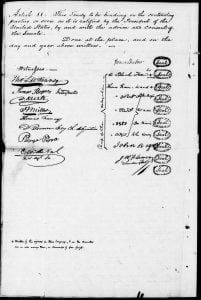Treaties for: Aionai, Anadarko, Apache, Appalachicola, Arapaho, Arikara, and Assinaboine Tribes. Names in (parentheses) are other names used for tribe. Aionai Treaties (I-On-I) Treaty of May 15, 1846 Anadarko Treaties (Ana-Da-Ca) Treaty of May 15, 1846 Apache Treaties Treaty of July 1, 1852 Treaty of October 17, 1865 Treaty of July 27, 1853 Treaty of October 21, 1867 Memorandum to Treaty of October 21, 1867 Appalachicola Treaty of October 11, 1832 Treaty of June 18, 1833 Arapaho (Arrapahoe, Arapahoe) Treaty of September 17, 1851 Treaty of February 15, 1861 Treaty of October 14, 1865 Treaty of October 17, 1865 Treaty … Read more


